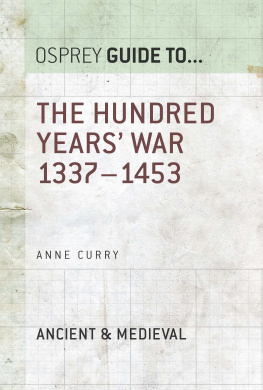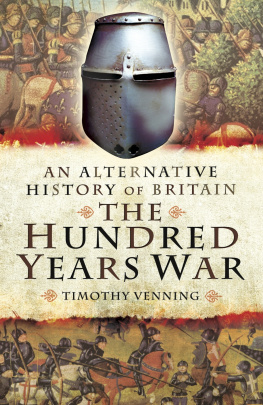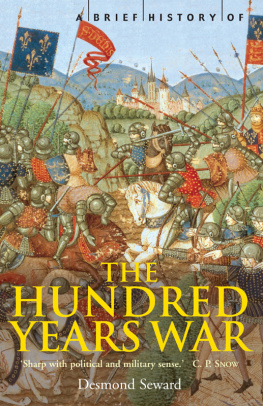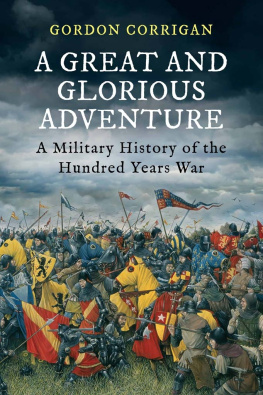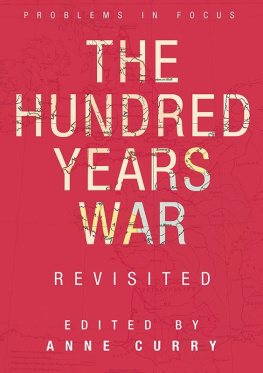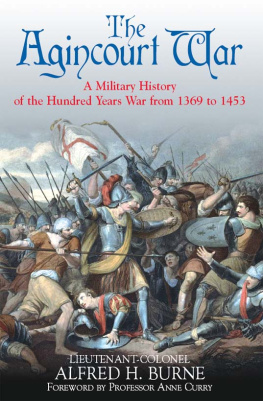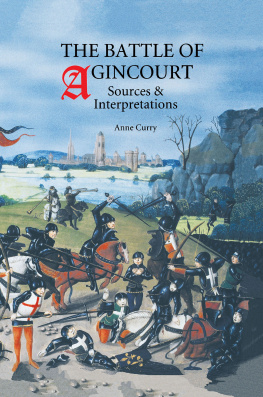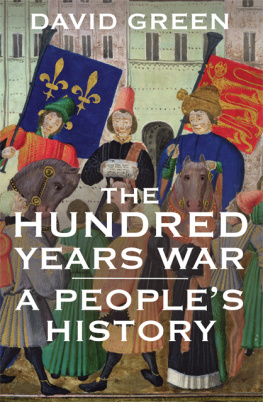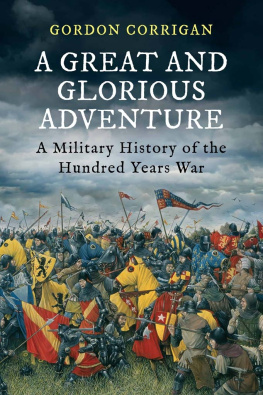Guide To
The Hundred Years' War
1337-1453
Anne Curry

Contents
Introduction
The Hundred Years War is a term invented in the mid-19th century for the late medieval conflict between England and France, although the actual war lasted for 116 years, from 1337 to 1453. England and France had been at war on several occasions before 1337 because of the tenurial relationship of their rulers. The kings of England were dukes of Aquitaine, an important area of south-west France from which most of Englands wine was drawn, but they were not sovereign there, as they held the duchy of the king of France. What seems to mark out the war that started in 1337 as different is that it involved a claim by English kings for the crown of France.
Historians have long debated the seriousness of Edward IIIs intentions when he declared himself king of France at Ghent in 1340. Did he really intend to make himself king? Or was he merely trying to use his hereditary rights as a potential claimant to the French throne as a bargaining counter, to win a breakthrough in the disputes that had plagued him and his predecessors over their French lands? This possibility seems to gain validity by the fact that Edward did give up his title king of France in the Treaty of Brtigny/Calais of 1360 in return for a territorial settlement in his favour. Given his apparent willingness to abandon the title, can we take seriously his resumption of it in 1369 when Charles V of France reopened the war by exploiting loopholes in the treaty of 1360? The English did so badly over the next 30 years that it is hard to see the claim as anything more than an empty threat.
Yet Edward IIIs successors, Richard II, Henry IV and Henry V, did call themselves king of France and were all involved in conflict with France. Did they have as their principal war aim the crown of France? Was this what prompted Henry Vs celebrated invasion of 1415? If so, why was he prepared to give up the title at the Treaty of Troyes in May 1420? But why, too, were the French prepared to accept him at that moment as heir and regent of their ruler, Charles VI, thereby disinheriting Charless own son (later Charles VII) and paving the way for a double monarchy of England and France a prospect as remarkable at the time as it might seem to us now?
As it happened, Henry V died a few weeks before Charles VI in 1422. Thus it was his nine-month-old son, Henry VI, who became king of both kingdoms. He was crowned as king of England at Westminster Abbey in November 1429, and as king of France at Notre Dame in Paris in December 1431. His crowning might suggest that the English had won the Hundred Years War. But the victory was short-lived. Neither a treaty nor a coronation could make the French accept a ruler who was king of their bitterest enemies.
In 1429 the tide began to turn, partly as a result of the triumphs of Joan of Arc, which add a remarkable, and still not wholly explained, dimension to this stage of the Hundred Years War. By 1450 the English had been expelled from their last remaining stronghold in Normandy, and in 1453 Gascony also fell. Only Calais, taken by Edward III in 1347 in the wake of his victory at Crcy in 1346, remained in English hands, hardly enough to justify the retention of the title king of France. Yet English kings did retain this title down to 1801, two and a half centuries after they lost their last toehold in France Calais, in 1558.
The Hundred Years War raises many problems over the war aims of the English kings and of French responses to them. It is also an intriguing war in military terms, not least because of what it suggests about the development of infantry and artillery, which some have deemed to constitute a veritable military revolution. The Hundred Years War contains many different styles of warfare: naval and terrestrial; sweeping, long-distance chevauches (mounted raids); systematic conquest and occupation; set-piece sieges and battles, as well as short, sharp periods of blitzkrieg; small-scale skirmishes and unofficial raiding and piracy. Although it was fought predominantly in France, England was itself a theatre because of raids on the south coast by the French and on northern England by their allies, the Scots.
There can be no doubt, too, that the Hundred Years War plays a fundamental part in the formation of both England and France as nation states. Taxation developed in order to finance the war. The demand for an effective military machine helped to create complex administrative structures and moves towards standing armies. There is nothing like a war, especially a long-drawn-out one, to promote a sense of awareness of national identity and unity. With English governments frequently reminding their subjects that the enemy French were intent upon invading and destroying the English tongue, it is not surprising that this tongue should be extolled, and the sense of Englishness thereby enhanced. Although wars in this period were still basically caused by, and fought over, the rights of kings, there can be no doubt that the Hundred Years War was waged between the peoples of both kingdoms, not least because the rulers made it so.
A hundred years is a long time, even in the medieval period where, without the benefits of modern communication methods, events took longer to be known outside the area in which they had occurred. Whilst we can identify broad themes and long-term consequences, it is also essential to emphasise the various phases of the war. But even this disguises the momentous changes in the fate of whole nations which might occur as the result of one event not least, for instance, the few hours on 19 September 1356 which saw the capture of John II at Poitiers, and led to the English triumph in the Treaty of Brtigny/Calais of 1360, or the murder of John the Fearless, Duke of Burgundy, on 10 September 1419 by the Dauphins supporters, which led to Henry Vs acceptance as heir and regent of France in the Treaty of Troyes of 1420.
At a more local, small-scale level, individual French villages might well regard the brief but often cataclysmic passage of English troops or of the free-booting routiers as their defining moment of the Hundred Years War, the kind of microcosmic detail that is necessarily lost in a book of this length. The aim here is to provide an overview of the war as a whole.
Chronology
| 120405 | Philip II conquers Normandy, Maine and Anjou |
| 1259 | Treaty of Paris between Henry III and Louis IX; homage paid for Aquitaine |
| 129498 | War between Edward I and Philip IV |
| 1295 | Franco-Scottish alliance |
| 132427 | War of Saint-Sardos between Edward II and Charles IV |
| 1328 | Death of Charles IV; crown passes to his cousin, Philip VI |
| 1329 | Edward III pays homage to Philip |
| 1333 | Edward defeats Scots at Halidon Hill |
| 1336 | Pope Benedict XII cancels Philips crusade; Philip demands Edward surrender Robert of Artois |
| First phase |
| 1337 | Philip VI declares Edwards lands confiscate |
| 1339 | Edward invades the Cambrsis |
| 1340 | Edward allies with Flemish and declares himself king of France; French fleet defeated at Sluys; Edward besieges Tournai |
| 134142 | Opening of Breton theatre |
| 1346 | Edward defeats French at Crcy |
| 1347 | Calais falls to Edward after 11-month siege |
| 1355 | Black Princes chevauche through Languedoc |
| 1356 | Black Prince captures John II at Poitiers |
Next page
